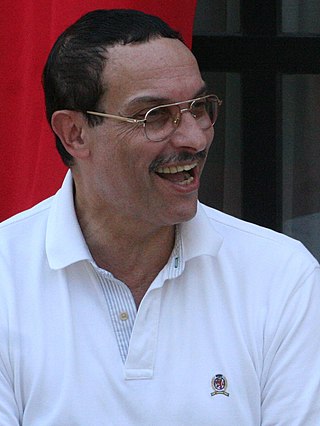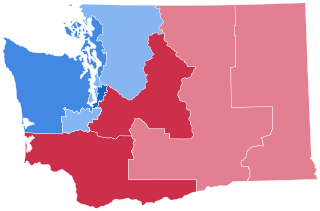
The 2008 United States presidential election was the 56th quadrennial presidential election, held on Tuesday, November 4, 2008. The Democratic ticket of Barack Obama, the junior senator from Illinois, and Joe Biden, the senior senator from Delaware, defeated the Republican ticket of John McCain, the senior senator from Arizona, and Sarah Palin, the governor of Alaska. Obama became the first African American to be elected to the presidency, as well as being only the third sitting United States senator elected president, joining Warren G. Harding and John F. Kennedy. Meanwhile, this was only the second successful all-senator ticket since the 1960 election and is the only election where both major party nominees were sitting senators.

The Mayor of Seattle is the head of the executive branch of the city government of Seattle, Washington. The mayor is authorized by the city charter to enforce laws enacted by the Seattle City Council, as well as direct subordinate officers in city departments.

Gregory J. Nickels is an American politician who served as the 51st mayor of Seattle, Washington. He took office on January 1, 2002 and was reelected to a second term in 2005. In August 2009, Nickels finished third in the primary election for Seattle mayor, failing to qualify for the November 2009 general election, and losing his bid for a third term as mayor. He left office on January 1, 2010.

The 2008 gubernatorial election in Washington was held on November 4, 2008. Republican Dino Rossi and incumbent Democratic Governor Christine Gregoire emerged from the August 19 primary. This made the 2008 election a rematch between the candidates from the 2004 election, the closest gubernatorial election in the state's history. In contrast to the recounts and months of legal challenges in their previous contest, Gregoire was the clear winner on November 5, earning 53 percent of the vote. With a margin of 6.45%, this election was the second-closest race of the 2008 gubernatorial election cycle, behind only the election in North Carolina.

James Dow Constantine is an American politician, lawyer, and urban planner in the state of Washington who is serving his third term as King County Executive, an office he has held since November 2009. He was in the state legislature and on the King County Council, chairing the latter before his election as executive. Constantine is a self-identified Democrat, though the executive's office is officially nonpartisan. He considered running for governor of Washington in the 2020 election but decided against it when incumbent Jay Inslee decided to seek a third term.

The 2010 United States Senate election in Pennsylvania took place on November 2, 2010, during the 2010 midterm elections. Incumbent Republican-turned-Democrat U.S. Senator Arlen Specter ran for reelection to a sixth term, but lost in the Democratic primary to Joe Sestak. Republican nominee Pat Toomey then won the seat.

The 2010 United States Senate election in Alaska took place on November 2, 2010, to elect a member of the United States Senate to represent the State of Alaska, alongside 33 U.S. Senate elections in other states, elections in all states for the U.S. House of Representatives, as well as various state and local elections. The general election was preceded by primary elections which were held on August 24, 2010. Scott McAdams, the Mayor of Sitka, became the Democratic nominee; Joe Miller, an attorney and former federal magistrate, became the Republican nominee after defeating incumbent U.S. Senator Lisa Murkowski. Miller was endorsed by the Tea Party movement and former Governor Sarah Palin. Murkowski announced that despite her defeat in the primary, she would run in the general election as a write-in candidate.

On November 2, 2010, Washington, D.C., held an election for its mayor. The primary elections occurred on September 14. Vincent Gray won the general election by a wide margin, although many voters wrote in incumbent Mayor Adrian Fenty, whom Gray defeated in the primary.

Michael McGinn is an American lawyer and politician. He served as mayor of the city of Seattle, Washington, and is a neighborhood activist and a former State Chair of the Sierra Club.

Elections were held on November 2, 2010, to determine Washington's nine members of the United States House of Representatives. Representatives were elected for two-year terms to serve in the 112th Congress from January 3, 2011, until January 3, 2013. Nonpartisan blanket primary elections were held on August 17, 2010.

Elections were held on November 2, 2010, to determine Mississippi's four members of the United States House of Representatives. Representatives were elected for two-year terms to serve in the 112th United States Congress from January 3, 2011, until January 3, 2013. Primary elections were held on June 1, 2010, and primary runoff elections on June 22.

The 2012 Washington gubernatorial election took place on November 6, 2012. Candidates in the election were chosen in an August 7, 2012 primary election, under the state's nonpartisan blanket primary system, which allows voters to vote for any candidate running in the race, regardless of party affiliation. The two candidates who received the most votes in the primary election qualified for the general election.

Michael J. O'Brien is an American politician and former member of the Seattle City Council who represented District 6 in northwest Seattle. He was first elected in 2009 to a different, city-wide council seat. He was the leading proponent of the opt-out list for the Yellow Pages. He was the only opponent of the proposed deep bore tunnel under downtown Seattle on the city council. He was chair of the local chapter of the Sierra Club before running for office. In this capacity, he was one of the leading opponents of the 2007 Roads and Transit ballot measure.

Peter S. Holmes is an American politician and attorney who served as the Seattle City Attorney from 2010 to 2022. He was elected in November 2009, defeating incumbent Tom Carr by a significant margin. After winning a second term uncontested in 2013, he defeated challenger Scott Lindsay in 2017 with nearly 75% of the vote, but failed to advance from the primary in a bid for a fourth term in the 2021 election.

The 2013 Seattle mayoral election took place on November 5, 2013, to elect the mayor of Seattle. Incumbent Mayor Michael McGinn ran for re-election to a second term in office.
Mark Sidran is a former Seattle City Attorney, serving three terms from 1990 to 2002. He is remembered most for his controversial "civility" laws.

The 2016 United States House of Representatives elections in Washington were held on November 8, 2016, to elect the 10 U.S. representatives from the state of Washington, one from each of the state's 10 congressional districts. The elections coincided with the 2016 U.S. presidential election, as well as other elections to the House of Representatives, elections to the United States Senate and various state and local elections. The primaries were held on August 2.

The 2017 Seattle mayoral election was held on November 7, 2017. It was won by former U.S. Attorney Jenny Durkan, who beat civic activist Cary Moon in the general election by 15 percentage points. The two candidates had advanced from an earlier primary election held in August, which ensured that Seattle would have its first female mayor since Bertha Knight Landes was elected in 1926. Municipal elections are officially nonpartisan though most candidates have declared party affiliations.

The 2021 Seattle mayoral election was held on November 2, 2021, to elect the Mayor of Seattle. It was won by former Seattle City Council President Bruce Harrell, who defeated then-current President Lorena González; both candidates had advanced from a nonpartisan primary election on August 3.

The 2021 Seattle City Attorney election was held on November 2, 2021. Incumbent City Attorney Pete Holmes sought reelection to a fourth term in office, but came third place in the officially nonpartisan August 3 primary election and failed to advance to the general election, with both Nicole Thomas-Kennedy and Ann Davison finishing ahead of Holmes in the primary. Davison defeated Thomas-Kennedy in the general election.


















